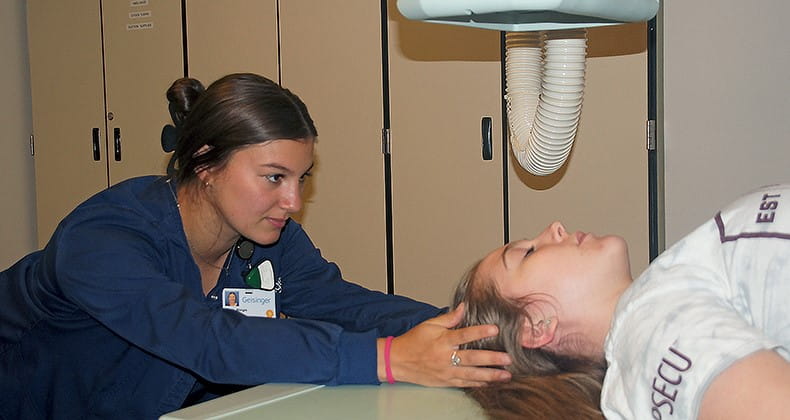
School of Radiologic Technology
About us
Education has been an important part of the Geisinger legacy since its beginnings in the early 1900s. The school recognizes that student success depends providing a strong academic program in conjunction with intensive clinical experiences. In order to enhance the school's academic program and encourage professional development, the school has arranged for Bloomsburg University services in the form of course work, billing agent, and financial assistance counseling. Upon enrollment students are also accepted as Bloomsburg University Medical Imaging students who thereby enjoy all campus services and opportunities the university offers.
Non-Bloomsburg University students enrolled in Geisinger’s program who hold an AAS degree may elect to continue with the university’s program to earn a bachelor of science degree.
Mission
The program’s mission is to utilize effective educational processes, adult learning techniques, and instructional design strategies to provide an educational environment, academic and clinical, which stimulates and facilitates students learning the art and science of radiography and mastering psychomotor skills necessary in the art of medical imaging so that graduates of the school are competent radiographers, skilled communicators and problem solvers, and individuals who value and seek professional growth.
Goal statements
1. Students will be clinically competent:
- Students will demonstrate radiographic positioning skills.
- Students will demonstrate radiographic technical factors applied to radiographic procedures.
- Students will demonstrate radiation safety practices.
2. Students will be able to effectively communicate:
- Students will communicate effectively with patients.
- Students will communicate effectively with health care professionals.
3. Students will demonstrate use of appropriate critical thinking skills:
- Students will demonstrate ability to adjust procedures in accordance with patient variables.
- Students will demonstrate ability to make critical image evaluation judgments.
4. Students will display professional behavior:
- Students will demonstrate professional behavior.
Program description
A 24-month certificate program of classroom academics and clinical experience prepares students for entry-level positions as radiologic technologists, eligible for the American Registry of Radiologic Technologists examination.
In addition, qualifying students have opportunities to gain limited experience in specialized radiographic procedures like angiography and computerized tomography (CT), and other forms of medical imaging, such as magnetic resonance imaging (MRI) during Semester VI electives.
Clinical education includes opportunities to learn to assist radiologists, interact with other health professionals, provide empathetic care to patients of all ages and medical conditions, and observe other primary disciplines including nuclear medicine, sonography and radiation therapy.
Accreditation
The School of Radiologic Technology is accredited by the JRCERT for an eight-year period. The next site visit is scheduled for Nov. 2023. See JRCERT standards.
Joint Review Committee on Education in Radiologic Technology
20 N. Wacker Drive, Suite 2850
Chicago, IL 60606-3182
mail@jrcert.org
Graduates are eligible for immediate employment or may seek additional post-primary* experience/education in advanced diagnostic procedures such as MRI, CT, or mammography. One-year programs are also available to graduates for certification in other primary disciplines: nuclear medicine, sonography and radiation therapy. Education in medical imaging can also be a springboard to training in other health careers such as physician assistant or physician.
*See ARRT website for additional information.

School Process
Policy 102: Transfer (PDF)
Policy 106: Complaint & Grievance Process (PDF)
Policy 112: Transfer Credits (PDF)
Faculty
Physicians and professional staff of the Department of Radiology all contribute to the learning process to ensure students a quality education. Department members providing classroom instruction do so on the basis of professional expertise and demonstrated teaching ability.


